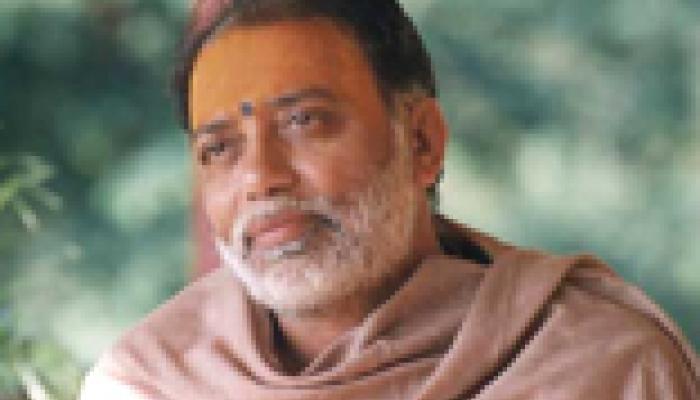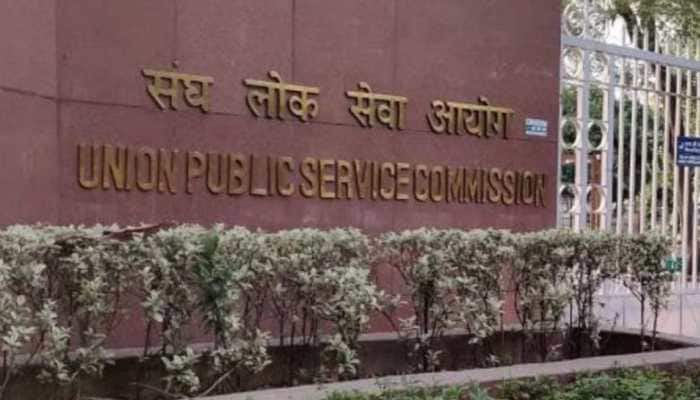We must be practical and not led by blind faith: Morari Bapu
Sarjana Sharma and Akrita Reyar of Zeenews.com spoke to Ram Katha Vachak Morari Bapu on Kumbh and its significance in the changing times.
Trending Photos
)
 A huge confluence of humanity has been gathering at Haridwar to participate in the Kumbh fete. The tradition has been uninterruptedly observed from times immemorial and serves to bind Indians like few other occasions do. Sarjana Sharma and Akrita Reyar of Zeenews.com spoke to Ram Katha Vachak Morari Bapu on Kumbh and its significance in the changing times. Kumbh is being observed at Haridwar these days. In the 21st Century, what is the relevance of Kumbh? Bapu: Kumbh is a pravahi parampara (flowing tradition) of Akhand Bharat. It is a unifying confluence of people, communities, sects, religions and languages. There was a very auspicious thought process behind its conception and Kumbh will remain a very auspicious occasion. With time, naturally it has undergone changes. But there has been Shraddha (devotion), Buddhi (intellect) and Bal (strength) behind it. In the Ram Charit Manas, it is said: “Dev, Danuj, Nar, Kinar Shreni; Sadar Majehi Sakal Triveni” (Demigods, demons, humans and others; they all devotedly bathe in the Triveni river). It is mentioned in the Ramayana that there were enlightened discourses on Brahma, Dharma, Karma, etc on such occasions. The common man felt a part of a religious process. He felt included. Also as there were fewer people then and there were discussions on Vigyanvidhi i.e. different departments of science, so for sure there must have been talk about the environment, about how to keep our rivers and air clean and also how to avoid too much noise and clamour. These issues are very much pertinent and current. But today when the rivers have become so dirty and polluted, is there any point left in the entire exercise at all? Bapu: According to me there is significance. Not just from a religious point of view, but even otherwise. I don’t know about Paap (Sin) and Punya (Good Deeds), but after bathing, a person does feel Pavitra (Purified) and Prasana (Pleased). After all, so many people in such large numbers have been visiting Kumbh for so many years, there must be something to it. But even the Akharas and Mutts set up by Adi Shankaracharya seem to be losing relevance. They no longer are centres of our devotion the way they used to be at one time… Bapu: Whatever has been set up by our ancestors should be transformed to keep up with the times. We should hold steadfast to the roots, but fresh and new flowers should surely blossom. The Shankracharyas of the four Peethas and other Peethadhacharis can think about it. But because we live under this sky of Dharma, we expect that these people must be thinking about it since a tradition should be Pravahi (flowing) and not Jada (Gross). What would you like to tell the people who visit Kumbh or are keen to? Bapu: I want to tell people that there is significance in bathing in the Ganges. But if a person is crushed in a stampede or killed or flows away in the current of the water, it is unfortunate. There is no need to create such a rush, especially on the main days. If there is too large a crowd, one can bathe on another day. The Ganges is ever flowing. Also, one can avoid crowded ghats(banks). I feel we must be practical and not led by blind faith to avoid unfortunate incidents. The idea is of bathing and purity. Talking of blind faith, there are people who believe excessively in astrology and grahas (astrological houses) for bathing at the Kumbh. They consult astrologers about the appropriate time and date even to take a dip. Please Comment. Bapu: Whether it is Sadhus or the common man, people who go with devotion can go anytime of the Kumbh. Even if you don’t bathe, because being winter months it may be too cold or a person maybe ill, and even if you take some water in your fist or just sprinkle some of it on your head, it is sufficient. I myself avoid crowded areas. In the Kumbh at Ujjain, the area where I bathed was far away from the main ghats that were being thronged. Someone commented that you are bathing at a place where the water comes after people have already dipped in it. I had said that that was even better because, who knows which saints may have purified the water even further! The idea was to say that we should not be superstitious. Wherever a lamp is lit, it spreads light all around. Any parting thoughts… Bapu: I would like to extend to your readers my very best wishes and I pray for their happiness. Quoting a few lines from the Ram Charit Manas, I would like to say: Jasu Naam Bhau Bheshaj Haran Ghor Treshul Sohi Kripal Mohe Tohe Par Ram Raho Anukul Whose very name removes the three kinds of grief that afflict humans, let that Ram shower his benevolence on us. My best wishes. Thank You.
A huge confluence of humanity has been gathering at Haridwar to participate in the Kumbh fete. The tradition has been uninterruptedly observed from times immemorial and serves to bind Indians like few other occasions do. Sarjana Sharma and Akrita Reyar of Zeenews.com spoke to Ram Katha Vachak Morari Bapu on Kumbh and its significance in the changing times. Kumbh is being observed at Haridwar these days. In the 21st Century, what is the relevance of Kumbh? Bapu: Kumbh is a pravahi parampara (flowing tradition) of Akhand Bharat. It is a unifying confluence of people, communities, sects, religions and languages. There was a very auspicious thought process behind its conception and Kumbh will remain a very auspicious occasion. With time, naturally it has undergone changes. But there has been Shraddha (devotion), Buddhi (intellect) and Bal (strength) behind it. In the Ram Charit Manas, it is said: “Dev, Danuj, Nar, Kinar Shreni; Sadar Majehi Sakal Triveni” (Demigods, demons, humans and others; they all devotedly bathe in the Triveni river). It is mentioned in the Ramayana that there were enlightened discourses on Brahma, Dharma, Karma, etc on such occasions. The common man felt a part of a religious process. He felt included. Also as there were fewer people then and there were discussions on Vigyanvidhi i.e. different departments of science, so for sure there must have been talk about the environment, about how to keep our rivers and air clean and also how to avoid too much noise and clamour. These issues are very much pertinent and current. But today when the rivers have become so dirty and polluted, is there any point left in the entire exercise at all? Bapu: According to me there is significance. Not just from a religious point of view, but even otherwise. I don’t know about Paap (Sin) and Punya (Good Deeds), but after bathing, a person does feel Pavitra (Purified) and Prasana (Pleased). After all, so many people in such large numbers have been visiting Kumbh for so many years, there must be something to it. But even the Akharas and Mutts set up by Adi Shankaracharya seem to be losing relevance. They no longer are centres of our devotion the way they used to be at one time… Bapu: Whatever has been set up by our ancestors should be transformed to keep up with the times. We should hold steadfast to the roots, but fresh and new flowers should surely blossom. The Shankracharyas of the four Peethas and other Peethadhacharis can think about it. But because we live under this sky of Dharma, we expect that these people must be thinking about it since a tradition should be Pravahi (flowing) and not Jada (Gross). What would you like to tell the people who visit Kumbh or are keen to? Bapu: I want to tell people that there is significance in bathing in the Ganges. But if a person is crushed in a stampede or killed or flows away in the current of the water, it is unfortunate. There is no need to create such a rush, especially on the main days. If there is too large a crowd, one can bathe on another day. The Ganges is ever flowing. Also, one can avoid crowded ghats(banks). I feel we must be practical and not led by blind faith to avoid unfortunate incidents. The idea is of bathing and purity. Talking of blind faith, there are people who believe excessively in astrology and grahas (astrological houses) for bathing at the Kumbh. They consult astrologers about the appropriate time and date even to take a dip. Please Comment. Bapu: Whether it is Sadhus or the common man, people who go with devotion can go anytime of the Kumbh. Even if you don’t bathe, because being winter months it may be too cold or a person maybe ill, and even if you take some water in your fist or just sprinkle some of it on your head, it is sufficient. I myself avoid crowded areas. In the Kumbh at Ujjain, the area where I bathed was far away from the main ghats that were being thronged. Someone commented that you are bathing at a place where the water comes after people have already dipped in it. I had said that that was even better because, who knows which saints may have purified the water even further! The idea was to say that we should not be superstitious. Wherever a lamp is lit, it spreads light all around. Any parting thoughts… Bapu: I would like to extend to your readers my very best wishes and I pray for their happiness. Quoting a few lines from the Ram Charit Manas, I would like to say: Jasu Naam Bhau Bheshaj Haran Ghor Treshul Sohi Kripal Mohe Tohe Par Ram Raho Anukul Whose very name removes the three kinds of grief that afflict humans, let that Ram shower his benevolence on us. My best wishes. Thank You.
Stay informed on all the latest news, real-time breaking news updates, and follow all the important headlines in india news and world News on Zee News.
Live Tv







)
)
)
)
)
)
)
)
)
)
